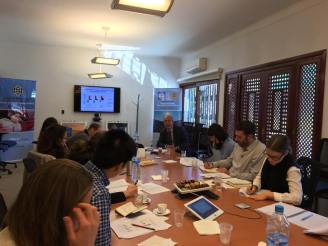
World Bank economist speaks with the group at their office in Rabat. Photo Courtesy of Argyro Nicolaou.
As highlighted during our visit to the World Bank’s office in Rabat, the local institutional environment is crucial for development. But while Morocco has pursued a policy of copy and pasting institutional templates that have succeeded elsewhere – so-called isomorphic mimicry – more deep-rooted changes are necessary.
Additionally, Morocco’s national institutional actors are arguably in a suboptimal equilibrium, with each favouring a position of mutual limited benefit rather than communal gain, causing inertia and preventing social change or hindering economic reforms.
Ultimately though, as has happened in the past, Morocco’s concern with its international image could become a main driver to pursue further economic and institutional reforms in the country, particularly with regard to its migration policies. International organizations can support this change but their neutrality is crucial in order to gain access to decision makers. Talking to the International Committee of the Red Cross they made this clear: in a country like Morocco, the form of their work is often as important as its substance.
– Johannes Laepple